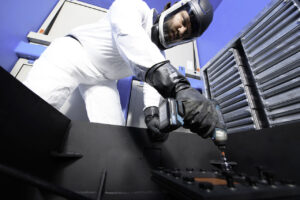Expanding its R&D laboratories in North America, Freudenberg Sealing Technologies has added a battery testing facility to its headquarters in Plymouth, Michigan.
The lab complements the company’s existing testing capabilities for batteries, H2 electrolyzers and fuel cells, and will increase its functional knowledge and product development capabilities in the field of electric vehicles (EVs). Simulation tests that replicate battery cycling scenarios are also possible in the new laboratory.
}
else {
console.log (‘nompuad’);
document.write(”)
}
// –>
}
else if (width >= 425) {
console.log (‘largescreen’);
document.write(‘‘)
}
else {
console.log (‘nompuad’);
document.write(”)
}
// –>
With industry experts predicting that the sale of EVs could top 100 million by 2030, it is imperative to vehicle manufacturers that challenges including range, power, safety and charging times are addressed. One solution – the use of lithium-ion batteries with higher energy and power densities – is an attempt to increase vehicle range and power.
However, these batteries have the potential to generate higher heat and pressure during use. Freudenberg Sealing Technologies’ new laboratory will allow engineers to observe thermal runaway and other events as they take place, and incorporate data generated during these tests into research and development activities.
 The new laboratory includes two 8 x 8 x 8ft (2.4 x 2.4 x 2.4m) steel test chambers in a reinforced test room. These house the cells, modules or batteries during test and have been designed by explosives experts. They withstand thermal events in single cells, modules and battery packs up to 25kWh.
The new laboratory includes two 8 x 8 x 8ft (2.4 x 2.4 x 2.4m) steel test chambers in a reinforced test room. These house the cells, modules or batteries during test and have been designed by explosives experts. They withstand thermal events in single cells, modules and battery packs up to 25kWh.
The test chambers are equipped with multiple video cameras and data acquisition systems that operate with more than 100 input channels and capture the data in excess of 60Hz, or 60 data points per second. The company can thus evaluate various operating conditions including thermal runaway caused by battery punctures, overheating and overcharging in these test chambers.
Chad Bauer, senior vice president of technology and innovation for the company, said, “This battery laboratory will help provide valuable insight and the data needed to design solutions for EV products. Our material development experience with fire and thermal applications began more than 20 years ago with our aerospace products and we continue to build upon this knowledge for EV applications.”
For more on battery and powertrain testing, please click here.
